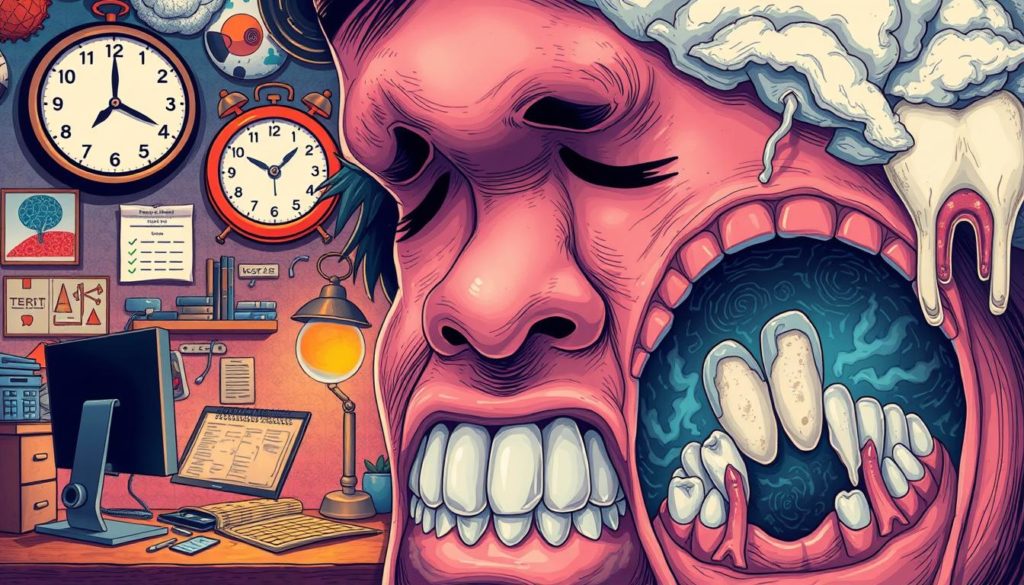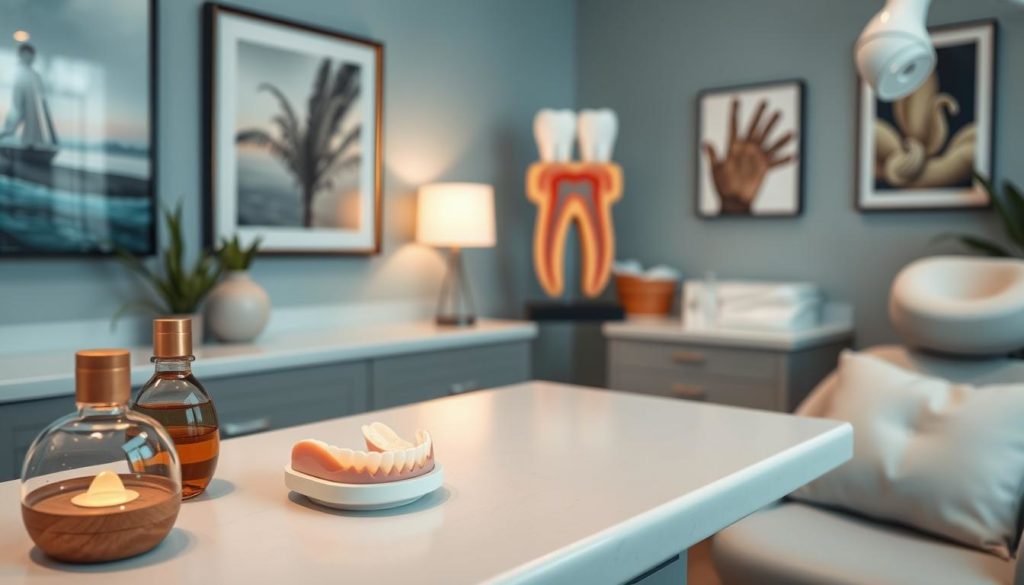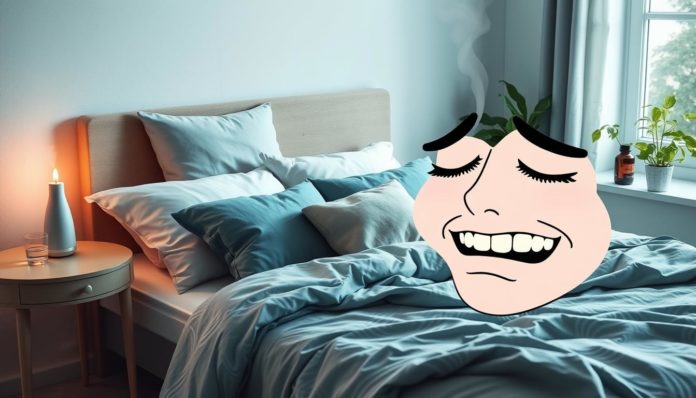Did you know nearly 10% of adults in the U.S. grind their teeth while sleeping? This is called Bruxism. It can cause health problems if not treated. Our guide has expert tips on Bruxism help, teeth grinding remedies, and ways to sleep better.
Teeth grinding affects more than just your sleep. It can lead to dental issues, headaches, and jaw pain. But, there are many ways to manage and treat it. We’ll cover the causes, symptoms, and treatments for Bruxism, so you can tackle it effectively.
Understanding the causes and using the right remedies can improve your sleep and oral health. Keep reading for expert advice and tips to help you relax and feel better.
Understanding Teeth Grinding: Causes and Symptoms
Teeth grinding, or bruxism, is common, especially when we sleep. Knowing the causes of teeth grinding and symptoms is key. It helps us act fast to stop it.

What Causes Teeth Grinding?
There are many reasons why people grind their teeth. Stress is a big one. It makes people clench their jaw or teeth when they’re stressed.
Other reasons include:
- Sleep disorders, such as sleep apnea
- Misaligned teeth, which may cause improper bites
- Certain medications, especially those affecting the central nervous system
- Lifestyle factors like excessive caffeine or alcohol consumption
Recognizing the Symptoms of Bruxism
Spotting bruxism symptoms is crucial. Look out for jaw soreness, headaches, and worn-down teeth. Other signs are:
- Increased tooth sensitivity
- Earaches, not related to ear conditions
- Disrupted sleep, often noticed by a sleep partner
- Cheek damage from chewing inside the mouth
Knowing these bruxism symptoms helps us find the right treatment. It also helps manage the causes of teeth grinding.
Effective Treatments for Teeth Grinding
There are many effective bruxism treatment options today. These range from dental care to changing how we behave. Finding the right treatment can stop teeth grinding and protect your teeth.

Using night guards is a common dental solution. These custom-made devices shield your teeth from grinding damage. Dental work like reshaping teeth or crowns can also help. It aligns your teeth, which can lessen grinding.
Behavioral changes are also key in fighting bruxism. Stress management, like mindfulness and exercise, can help. These methods tackle the stress and anxiety that often cause teeth grinding.
| Treatment Option | Benefits | Considerations |
|---|---|---|
| Night Guards | Protects teeth from wear | Requires custom fitting |
| Bite Correction | Aligns teeth to reduce grinding | May involve multiple dental visits |
| Stress Management | Addresses root cause of bruxism | Varies by individual needs |
Using a mix of these bruxism treatment options can offer a full solution. Whether you choose dental care or behavioral changes, picking the right method is key. It’s important for lasting relief.
How to Prevent Teeth Grinding
Stopping teeth grinding is key for good dental health. Daily habits and long-term plans can help a lot. Here are ways to lower the risk of bruxism.
Daily Habits to Reduce Bruxism
Some daily habits can really cut down on teeth grinding. Here are some easy tips:
- Be aware of your jaw’s position. Keep your teeth apart to relax your jaw.
- Try stress management techniques like deep breathing or yoga to reduce stress.
- Stay away from caffeine and alcohol, especially at night, as they can make muscles work harder.
- Keep a regular sleep schedule to help your body relax better.
Long-Term Prevention Strategies
For lasting prevention, try these long-term strategies:
- Do regular exercise to lower stress, which can help prevent bruxism.
- Go to dental check-ups often to catch and fix any dental problems that might lead to grinding.
- Think about cognitive-behavioral therapy (CBT) to tackle anxiety or stress.
- Use mouthguards as your dentist suggests to protect your teeth while you sleep.
Adding these habits and plans to your life can greatly help in preventing teeth grinding and improving your oral health.
Teeth Grinding (Bruxism): What You Need to Know
Understanding Bruxism is key for those who grind their teeth a lot. If not treated, it can harm your oral health a lot. This part will give you all the info you need about teeth grinding and its risks.
Introduction to Bruxism
Bruxism, or teeth grinding, is when you clench or grind your teeth without realizing it. It usually happens when you’re asleep. It can be caused by stress, anxiety, an uneven bite, or sleep problems. Catching bruxism early is important to avoid damage.
Risks Associated with Untreated Bruxism
Not dealing with bruxism can lead to big dental and health problems. Here are some complications of teeth grinding:
- Severe dental damage like worn enamel and chipped teeth
- Increased tooth sensitivity
- Jaw disorders like Temporomandibular Joint (TMJ) syndrome
- Chronic facial pain and headaches
- Sleep problems that affect your overall health
Knowing about Bruxism helps avoid these risks. Getting help early can stop these problems and make life better. Here’s a look at common symptoms and risks:
| Symptom | Potential Risk |
|---|---|
| Teeth grinding | Dental erosion |
| Jaw clenching | TMJ disorders |
| Facial pain | Chronic headaches |
| Tooth sensitivity | Increased chance of cavities |
Expert Tips for Immediate Teeth Grinding Relief
Looking for quick relief from bruxism discomfort? There are simple, effective methods you can try at home. They can help ease your jaw tension and promote relaxation.
Home Remedies for Bruxism Relief
There are many home remedies for bruxism. They aim to ease jaw tension and help you relax:
- Jaw Massages: Regular jaw massages can help reduce tension. They also prevent teeth grinding at night.
- Warm Compresses: A warm compress on your jaw before bed can soothe discomfort. It promotes relaxation.
- Aromatherapy: Essential oils like lavender can create a calming environment. This makes sleep more restful and reduces teeth grinding.
Using these bruxism home remedies can offer quick relief. They can also improve your overall comfort.
When to Seek Professional Help
Home remedies can provide temporary relief. But, knowing when to seek professional help is crucial. If your bruxism symptoms persist or worsen, you should see a dentist.
Chronic pain, frequent headaches, or noticeable tooth damage are signs to see a dentist. They can help with custom mouthguards, stress management, or dental procedures. Acting quickly can prevent further problems and manage teeth grinding effectively.
The Benefits of Using a Bruxism Night Guard
Using a Bruxism night guard can change your life if you grind your teeth. These guards protect your teeth and lower jaw tension, giving you relief. There are two main types: custom dental guards and over-the-counter night guards.
Types of Night Guards
Knowing the differences between night guards helps you choose the right one:
| Type | Description | Pros | Cons |
|---|---|---|---|
| Custom Dental Guards | Made just for you by a dentist | Perfect fit, very comfortable, lasts long | Expensive |
| Over-the-Counter Night Guards | Ready-made guards at stores | Affordable, easy to find | Less comfy, not as good |
How Night Guards Can Help
Both custom and over-the-counter night guards have big benefits. They act as a cushion, stopping teeth from grinding. This can prevent dental damage and jaw muscle pain.
Wearing a night guard also keeps your jaw in the right position. This is good for your overall mouth health.
Lifestyle Changes to Stop Teeth Grinding
Making some simple lifestyle changes can help a lot with Bruxism. These changes can help you stop grinding your teeth naturally. They also promote healthier habits.
Eating well is a big part of stopping Bruxism. A diet full of vitamins and minerals can make your teeth stronger. Eating more fruits and veggies and cutting down on caffeine and alcohol can help a lot.
Exercise is also key in managing stress, which often leads to teeth grinding. Activities like yoga, jogging, or a brisk walk can help. They lower your stress and reduce grinding.
Getting enough sleep is also crucial. A regular sleep schedule and a relaxing bedtime routine can help a lot. Avoiding screens before bed and making your sleep area comfy are important steps.
Try these healthier habits:
- Drink less caffeine and alcohol
- Move more every day
- Try deep-breathing exercises to relax
By making these lifestyle changes, you can live a healthier life. You’ll avoid the pain and damage from teeth grinding.
| Key Lifestyle Changes | Benefits for Bruxism |
|---|---|
| Balanced Diet | Strengthens teeth and reduces grinding |
| Regular Exercise | Reduces stress levels |
| Good Sleep Hygiene | Promotes restful sleep and less bruxism |
Professional Solutions for Chronic Teeth Grinding
Dealing with chronic teeth grinding needs a mix of dental treatments and stress management. Advanced dental care and stress therapy can help a lot. This part talks about the dental and stress treatments that can offer lasting relief.
Dental Treatments for Bruxism
Dental treatments are key in fighting chronic teeth grinding. Occlusal adjustment reshapes teeth to fix bites. Crowns, bridges, or orthodontics can also fix teeth alignment.
It’s important to talk to a dentist to find the right treatment for you.
Therapy Options for Managing Stress
Stress often causes teeth grinding, making stress therapy crucial. Cognitive-behavioral therapy (CBT) is known to help manage stress and anxiety. Mindfulness, relaxation, and counseling can help patients deal with stress better.
Yoga and aerobic exercises are also great for reducing stress. They help lessen the effects of teeth grinding.
FAQ
What Causes Teeth Grinding?
Teeth grinding, or bruxism, can be caused by stress, anxiety, misaligned teeth, and sleep disorders. Finding the root cause is key to managing it.
What Are the Symptoms of Bruxism?
Symptoms include jaw soreness, headaches, and worn tooth enamel. Tooth sensitivity and disrupted sleep are also signs. If you notice these, see a dentist.
How Can I Prevent Teeth Grinding?
To prevent teeth grinding, manage stress, eat well, exercise, and sleep well. Wearing a night guard can also protect your teeth.
What Are the Best Treatments for Teeth Grinding?
Treatments include dental night guards, stress management, and sometimes medication. Your dentist can create a treatment plan for you.
Can Teeth Grinding Cause Severe Damage?
Yes, bruxism can cause cracked teeth, tooth loss, and TMJ disorders if not treated. Early treatment is crucial to avoid serious damage.
Are There Home Remedies for Bruxism Relief?
Home remedies like jaw massages and warm compresses can help. But, see a professional if symptoms persist.
When Should I See a Dentist for Teeth Grinding?
Seek professional help if teeth grinding causes pain, discomfort, or dental damage. A dentist can create a treatment plan for you.
What Types of Night Guards Are Available?
You can find over-the-counter and custom-made dental guards. Custom guards fit better and protect your teeth more effectively.
How Do Night Guards Help with Bruxism?
Night guards protect your teeth by reducing jaw muscle strain. They ease the pressure that causes grinding, making them a common solution.
What Lifestyle Changes Can Reduce Teeth Grinding?
Manage stress, improve sleep, cut down on caffeine and alcohol, and eat well. Regular exercise can also help reduce tension.
What Professional Solutions Are Available for Chronic Teeth Grinding?
For chronic bruxism, dental treatments like occlusal adjustments and restorative procedures are available. Stress management therapy is also helpful. Working with a dentist and therapist can address both physical and psychological aspects.


